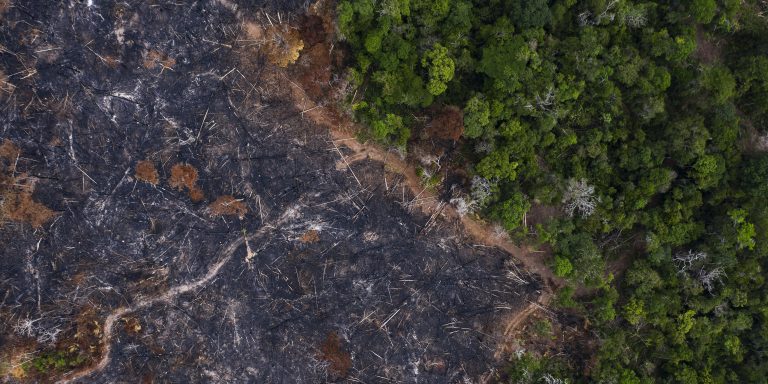INTELBRIEF
August 14, 2020
IntelBrief: COVID-19, Political Polarization, and Deforestation in Brazil’s Amazon

Bottom Line Up Front
- The COVID-19 pandemic has contributed to a significant increase in the deforestation of the Brazilian Amazon compared to previous years.
- While public attention is understandably focused on Brazil’s health crisis, Jair Bolsonaro’s government has intensified ‘economic use’ policies allowing extractive activity in the Amazon.
- The paucity of Amazon protection efforts has global implications, including threatening the $19 trillion international trade deal between the European Union and MERCOSUR countries.
- From a security standpoint, a failure of the EU-MERCOSUR deal will further exacerbate deforestation and indirectly increase drug and human trafficking in Brazil and the broader region.
Deforestation alerts, issued by the short-term deforestation system of Brazil’s National Institute for Space Research (INPE), reveal that the classification of ‘vulnerable areas’ of the Brazilian Amazon has increased by 59% compared to last year, with effects amplified by the COVID-19 pandemic. Brazilian President Jair Bolsonaro’s policy of ‘economic use,’ which encourages commercial uses of the Amazon, has collided with a lack of oversight of illegal deforestation due to COVID-19 concerns, which has caused damage to the Amazon region. This policy is seen as threatening the Amazon under the guise of agricultural, mining, and energy projects. Gaining most from deforestation, the agriculture industry occupies 95 percent of deforested areas. The Amazon, currently at 18 percent tree cover loss, is set to pass a point of no return if this figure reaches 20-23 percent. After that, the forest will fail to sustain itself and instead shift to savannah and brush, altering temperatures and rainfall patterns across all of Latin America, which will lead to other second and third order effects in countries unequipped to deal with a climate crisis.
While the coronavirus has killed over 103,000 people in Brazil resulting in the country recording the second highest number of COVID-19 deaths in the world (after only the United States, at 165,000 plus), a decree called a ‘land-grabbing amnesty’ by former Environment Minister Marina Silva has been allowed to proceed, legalizing self-declaration of land ownership in the Amazon. It will soon be up for a vote in the House and Senate, before final approval into law. The far-right establishment, however, led by Bolsonaro, remains focused both on pleasing the international community on environmental protection and softening the impact that a predicted 6% contraction in Brazil’s economy might have on 5,000 key municipal elections in October. Political polarization between the virus-denying far-right populist establishment and more pragmatic liberal political parties has increased amidst the COVID-19 crisis. Despite being a minority in government, the left has not acquiesced; Congress passed COVID-19 stimulus funding for low-income Brazilians while voting down bills favored by Bolsonaro, and courts have begun blocking basic administrative requests from the right. In a bitter response, pro-Bolsonaro social media bots have been unleashed on Rodrigo Maia, the speaker of the lower house of Congress and the president’s most prominent critic.
A military operation of 3,800 Brazilian troops deployed to enforce environmental protection in the Amazon called Operaçao Verde 2 has fallen short of international standards. As a result, the trade deal between the European Union and MERCOSUR nations of Argentina, Brazil, Paraguay and Uruguay is in jeopardy until protection of the Amazon improves. The deal, promising an open market valued at US$19 trillion, was set to eliminate import taxes to Europe on most Latin American agricultural products. Brazil has openly flouted the 2015 Paris Climate Agreement through its aggressive ‘economic use’ and land ownership legislation in the Amazon. The Dutch parliament, Austria, Belgium, Ireland and Luxembourg, and EU parliamentarians, have tried to block the trade deal, citing concerns that it unfairly competes with EU farmers. Deforestation and COVID-19 have dampened hopes of the EU and MERCOSUR trade deal’s ratification in early 2021. Depending on the severity of this year’s August and September fire season in the Amazon,which is already underway despite denials from Bolsonaro, the entire deal could collapse. The breakdown of the deal would be a major lost opportunity to keep Brazil accountable on preserving the Amazon.
Pulling out of the EU-MERCOSUR deal has security repercussions. Illegal logging by criminal networks that carry out a significant part of deforestation results often in threats, injuries, and deaths. These criminal groups, called ‘îpe mafias’ after one of the most lucrative timber types in Brazil, are driven by the estimated $8.5 billion in profits their illegal logging makes each year. COVID-19 has sapped enforcement resources and complicated travel to remote areas of the Amazon. The lull has allowed îpe mafias to increase their extractive power during the pandemic, thus increasing their overall capabilities, including drug smuggling and human trafficking. Primarily focused on the coca plant, criminal networks clear areas of the forest and threaten or force the migration of indigenous populations living there. Because such offenses in the Amazon occur on federal land, Brazil’s federal courts are responsible for bringing the traffickers to justice. According to the most recent report from the U.S. Department of State, fewer traffickers were prosecuted in 2019 than in previous years. Equally as concerning are the chemical impacts of coca production, which are measured at 2 metric tons of toxic waste per hectare of coca. This waste is disposed of on riverbanks and crop fields, devastating soil, hydrology, and biodiversity. Consequently, rampant drug trafficking increases hunger. It also results in spillover effects in neighboring countries, including Peru and Colombia, imperiling already-low food production in the region. The drug trade’s impact reaches as far as Ecuador, which suffers from violence as a result of being a transit hub for narcotics. Overall, the impact of COVID-19 exacerbates deforestation and jeopardizing human security in surrounding countries. The ratification of the EU-MERCOSUR trade deal could mitigate much of this toll by compelling an increasingly politically divided Brazil to be more stringent on environmental protection of the Amazon.